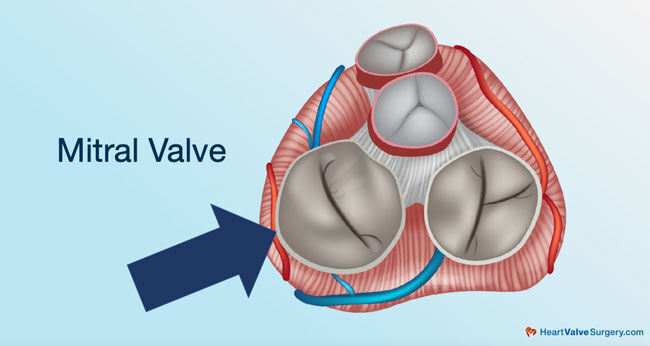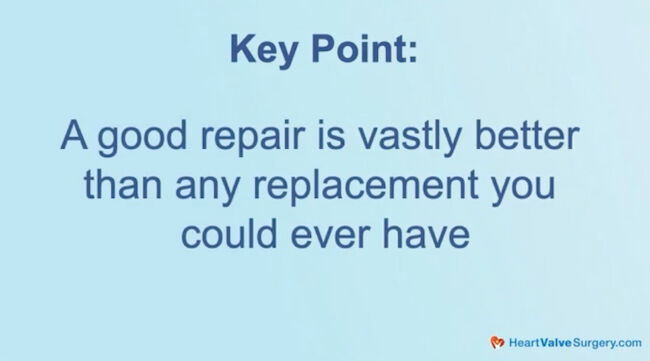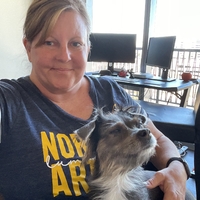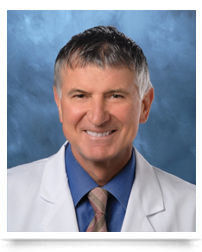Mitral Valve Surgery: How To Choose Your Surgeon & Hospital
Written By: Allison DeMajistre, BSN, RN, CCRN
Medical Expert: Dominic Emerson, MD, Director of Robotic Cardiac Surgery, Cedars-Sinai, Los Angeles, California
Reviewed By: Adam Pick, Patient Advocate, Author & Website Founder
Published: April 2, 2025
When patients find out that their mitral valve needs to be repaired or replaced, they may experience a wide range of thoughts and emotions. The amount of information that patients receive in a short period, along with a steep learning curve to understand their disease, can be overwhelming. Patients and their care partners may need to make several decisions, sometimes within a short timeframe, depending on the severity of their mitral valve defect.

Perhaps the two most consequential decisions they will make are “Who will perform the surgery?” and “Where the mitral valve procedure be done?” An experienced, multidisciplinary surgical team at a center of excellence is integral to a successful surgery along with a proper plan to manage their mitral valve disease for years to follow.
But where should patients start?
To help our mitral valve patients learn more about choosing a surgical program that will fit their needs and to start making these crucial decisions, we recently met with Dr. Dominic Emerson, the Director of Robotic Cardiac Surgery at Cedars-Sinai in Los Angeles. Mitral valve surgery is one of Dr. Emerson’s specialties. So, we were thrilled to have Dr. Emerson offer his valuable insights.
Key Learnings About Mitral Valve Surgeons and Hospitals
Here are the important insights shared by Dr. Emerson during our interview:
- There are many factors to consider when selecting a mitral valve surgeon. “There are a lot of different factors that go into it,” he said. “Choosing a mitral valve program not only depends on your surgeon but on the institution and the team as a whole. You want to go to a place where you’ll be comfortable and where providers can take good care of you as a whole person, and that can take on a lot of different forms depending on the pathology you’re treating.

- Patients with mitral regurgitation, a leaking heart valve, should seek a care team that specializes in mitral valve repair. “One thing specific to the mitral valve that we know is that a good repair is vastly better than any replacement you could ever have. I think that’s very important to think of when you’re choosing a cardiac center,” stated Dr. Emerson.
- There are Mitral Valve Centers of Excellence that patients may want to contact. “You want to go to a center with a good track record of providing high-quality repairs and a very high repair rate.” He noted that the centers of excellence with successful programs can be found through the Mitral Valve Repair Reference Center Award Program. The program designates centers across the United States, Cedars-Sinai being one of them, with at least a 95 percent chance of repair for patients with degenerative mitral valve disease.

- Emerson recognized that patients may want to travel for a mitral valve repair at a Mitral Valve Center of Excellence. “I think it is important to weigh the distance from your family and normal surroundings to a leading mitral valve center.”
- There are different approaches to accessing the mitral valve including sternotomy, minimally-invasive and robot-assisted. “Another thing I would think of is the surgical approach,” said Dr. Emerson. “As a robotic cardiac surgeon, I’m very invested in that technology, and I think that robotic cardiac surgery not only provides a surgeon the ability to treat the valve better, but I think there are better repair rates with robotic cardiac surgery. Also, it’s a little faster recovery for patients. It’s a smaller incision and a little easier on the patient. So, that would factor heavily into where I would choose to have my valve done.”
- Emerson also added that robotic cardiac surgery is a limited technology. “Not everybody is doing robotic mitral valve repair – maybe a hundred centers in the United States are currently doing it,” he said. But, I think the advantages that approach offers would definitely factor into my decision-making.”
Thanks Dr. Emerson and Cedars-Sinai!
On behalf of everyone in the HeartValveSurgery.com community, thank you, Dr. Emerson, for helping our mitral valve patients make these important decisions when planning their surgery. And thanks to Cedars-Sinai for caring for our heart valve patients!
Related links:
- Patient Webinar: Minimally-Invasive Heart Valve Surgery with Dr. Emerson
- New Robotic Mitral Valve Surgery Patient Education Center
- Surgeon Q & A: The Recovery from Mitral Valve Surgery
Keep on tickin,
Adam
P.S. For the deaf and hard-of-hearing members of our patient community, we have provided a written transcript of our interview with Dr. Emerson below.
Video Transcript:
Adam Pick: Hi, everybody. It’s Adam with HeartValveSurgery.com, and we’re at Cedars-Sinai Medical Center in Los Angeles, California. I am thrilled to be joined by Dr. Dominic Emerson, who is the Director of Robotic Cardiac Surgery.
Dr. Emerson, it is great to see you again, and thanks so much for being with me today. Dr. Emerson, one of your specialties is mitral valve surgery. We’ve got a lot of mitral valve patients in our community watching this video right now. The question that I have for you is, “Given all that you know about mitral valve repair and replacement, how would you choose a mitral valve surgery program?”
Dr. Dominic Emerson: I think that’s a great question. And it’s actually not an easy one to answer.
There’s a lot of different factors that go into it. Choosing a mitral valve program I think depends not only on your surgeon but on the institution and the team as a whole. You want to go to a place that you’re going to be comfortable with and with providers that are going to be able to take really good care of you as a whole person.
That can take a lot of different forms depending on what exactly the pathology that you’re treating is. One of the things that we know, really specific to the mitral valve, is that a good repair is vastly better than any replacement you could ever have. And so, I think that’s very important to think of when you’re choosing a cardiac center.
You want to go to a center that has a good track record of providing high quality repairs, that the repair rate is very high. The centers of excellence that are out there, and Mitral Valve Repair Reference Centers, which is a designation that’s given to about 25 centers in the United States, Cedars-Sinai being one of them, indicates that those centers have at least a 95 percent chance of repair for patients with degenerative mitral valve disease.
I think that’s a good marker of a really a successful program. That doesn’t mean that you have to travel a huge amount of distance potentially. And, I think that it is important to weigh the distance from your family and from your normal surroundings to a leading mitral valve center.
One other thing that I would think of is the surgical approach. As a robotic cardiac surgeon, I’m obviously very invested in that technology, and I think that robotic cardiac surgery not only provides you as a surgeon with an ability to, treat the valve better but I think there are better repair rates with robotic cardiac surgery. Also, it’s a little bit faster recovery for patients. I think it’s a smaller incision, a little easier on the patient. So, that would factor heavily into where I would choose to have my valve done.
Now that is a limited technology. Not everybody’s doing robotic mitral valve repair – maybe a hundred centers in the United States are doing it currently. But, I think because of the advantages that that approach offers, I think that that would definitely factor into my decision making.
Adam Pick: Well, Dr. Emerson, on behalf of the patients in our community, those specifically mitral valve disease, thank you for sharing your insights specific to how you would select a mitral valve program to treat your disease. On behalf of everybody at HeartValveSurgery.com, thanks for everything you and your team are doing here at Cedar-Sinai in Los Angeles, California. Thanks so much.




